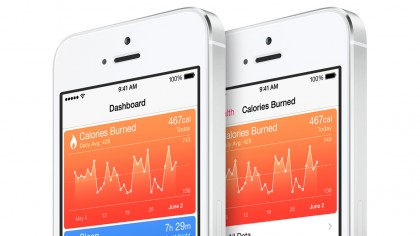iPhone 6 vs iPhone 6 Plus: Apple's two latest smartphones go head to head
Will you supersize your next iPhone?
Sign up for breaking news, reviews, opinion, top tech deals, and more.
You are now subscribed
Your newsletter sign-up was successful
iPhone 6 vs iPhone 6 Plus: CPU and RAM
The iPhone 6 and iPhone 6 Plus unsurprisingly make the jump to Apple's A8 64-bit dual-core processor, giving it more oomph for your games and video editing. On-board RAM remains constant at 1GB, however, so for most day-to-day tasks you're not going to notice a huge difference in the capabilities of these two phones.
The iPhone 6 and the iPhone 6 Plus match in terms of storage capacities too: for the first time there's a 128GB level to join the 64GB and 16GB options. You can pick any of these three with any handset, though the iPhone 6 Plus is more expensive across the board, so you'll be paying more for the same amount of space in return for a larger device and clearer display.
Both the iPhone 6 and the iPhone 6 Plus drop the 32GB capacity, so if you want more than 16GB but don't need as much as 64GB, then sadly you're out of luck. We'd have rather seen Apple ditch the 16GB versions and kept the 32GB capacity.
iPhone 6 vs iPhone 6 Plus: Health
We heard plenty about iOS 8 and HealthKit back at WWDC 2014 in June 2014, and the newest iPhones come with all the sensors and gadgetry required to make the most of these features.
There are no differences between the two devices in terms of the sensors they include - driven by the all-new M8 processor - and the main Health app that they run to keep track of all your vital signs.

Again, the only variation you need to think about is the size: the iPhone 6 is slightly easier to take out on a jog or to the gym, while the phablet-style iPhone 6 Plus is better suited for sitting back on the couch and checking out how well your fitness has improved over the past few weeks.
Both give you full access to Apple's new health platform.
Sign up for breaking news, reviews, opinion, top tech deals, and more.
iPhone 6 vs iPhone 6 Plus: Battery
The iPhone 6 Plus's larger frame means more room for a bigger battery. It also has more screen to illuminate.
Apple is telling us that its battery lasts for longer than the standard iPhone 6 - 16 days of talk time as opposed to 10, 24 hours of 3G talk time as opposed to 14, 80 hours of audio playback as opposed to 50, and 14 hours of video playback as opposed to 11. Both phones are upgrades on the iPhone 5S and iPhone 5C in terms of battery life, but the iPhone 6 Plus goes even further.
In our tests we found that during light-to-medium use, which included checking emails, recording video, taking a few photos and a couple of hours of listening to offline tracks in Spotify, the iPhone 6 lasted 13 hours with a battery drop to 33%.
The iPhone 6 Plus lasted from 7am to around midnight after a day of similar use, and there was still battery life left before it was plugged in at night.
In our TechRadar battery test the iPhone 6 lost 26% of its battery when playing a looped 90 minute full HD video. The iPhone 6 Plus did slightly worse in the test, losing 27%, showing that on video it's not the strongest thanks to the extra pixels, although in day to day use it fares better.
iPhone 6 vs iPhone 6 Plus: Price
If you've read all the way through this article, you'll know that the iPhone 6 Plus comes with some premium features - bigger screen, more pixels, landscape mode - and those features come with a premium price too.
It's $100 more than the iPhone 6 at each price point, with the smaller iPhone 6 starting at $199 for the 16GB edition and the larger iPhone 6 Plus starting at $299 for 16GB. If you splash out on the new 128GB version of the Plus, you're looking at the most expensive iPhone yet.
SIM-free in the UK, the iPhone 6 will set you back £539 (16GB), £619 (64GB) or £699 (128GB). For the iPhone 6 Plus you can add on £80 or more - that equates to £619 (16GB), £699 (64GB) and £789 (128GB). Those prices will be lower on any contracts you sign with mobile operators.
For the US, contracted prices are all we have right now. $199 (16GB), $299 (64GB) and $399 (128GB) for the iPhone 6, and exactly $100 more expensive at each point for the iPhone 6 Plus.

Dave is a freelance tech journalist who has been writing about gadgets, apps and the web for more than two decades. Based out of Stockport, England, on TechRadar you'll find him covering news, features and reviews, particularly for phones, tablets and wearables. Working to ensure our breaking news coverage is the best in the business over weekends, David also has bylines at Gizmodo, T3, PopSci and a few other places besides, as well as being many years editing the likes of PC Explorer and The Hardware Handbook.